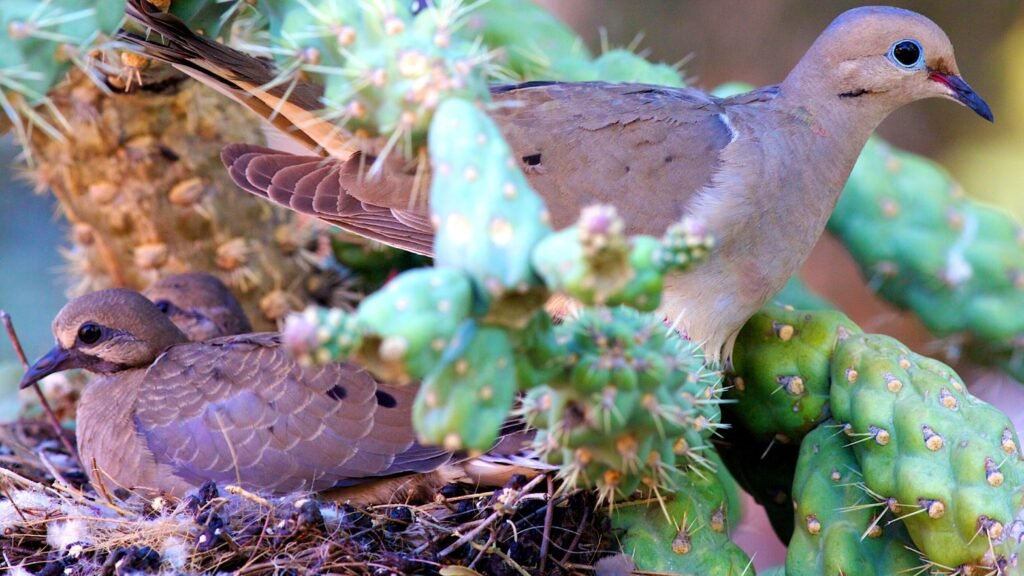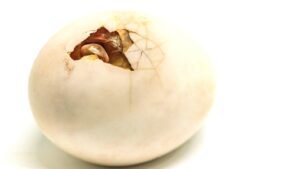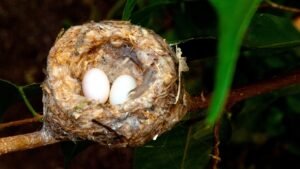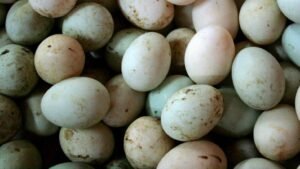Doves are gentle animals with prolific breeding habits. Female doves are known to reach sexual maturity as early as seven months and can breed up to six times in a breeding season. If you have heard doves coo, you won’t be wrong to think that the sound is sad and mournful. But don’t worry, the sound isn’t a harbinger of death; instead, it indicates the start of their breeding season.
It takes about 14-15 days for dove eggs to hatch. Doves lay two eggs every time. It is unheard of for them to lay one or more than two.
Dove Mating Habits
One of the interesting things about doves is their mating habits. Unlike the hummingbird, mourning doves mate for life. They usually pair up every breeding season to mate unless the female or male dies.
The mating ritual of the dove is also a showy affair. Even though it doesn’t involve any neck-breaking flight, such as found in the mating ritual of hummingbirds, the mating ritual of doves is interesting to watch. The male flies vigorously, flapping his wings noisily, then bows, popping out his breast and bobbing his head.
The male dove also chases its rival from the territory he has chosen to nest. The male will also coo more loudly than normal, signaling that he is ready to mate. The female dove is so impressed with this display that a bond is formed between them immediately.
Both the male and the female participate in building their nest. If you’ve ever seen a dove, you will marvel at how shoddy their nest-building skills are. Their nests are so shoddily built that you may even see the insides of the nest from the outside. However, this style of nest building has always worked for doves. With their population ranging from 100 to 475 million in North America.
How Long Does It Take For Dove Eggs To Hatch?

The hatching of dove eggs happens after 14 days of incubation. Male doves have a lot of parental instincts—possibly one of the best in the Avian world. Once the eggs are placed in the nest, the male is more than happy to take turns incubating the eggs. This behavior isn’t found in birds such as hummingbirds and chickens.
If you are a bird watcher, watching a dove nest, you may be deceived into thinking that the same dove has been sitting on the eggs all day. However, that isn’t true. Because male and female doves are so similar, you may erroneously think they are the same bird. The male dove comes in the evening to relieve the female of the incubation work. So, if you aren’t present when this exchange is made, you may think it’s the same bird sitting on the eggs.
Doves like to build their nests in open woodlands. This allows them to feed on seeds while they care for their young. They locate their nests in the crotch of a tree. Doves build their nests about 5-25 ft off the ground.
When the chicks hatch, mom and dad will feed and care for them for an extra four to five days. They provide their babies by developing what is called “Crop milk.” Crop milk is produced in the mouth of both the male and female. Crop milk is rich in antioxidants and has a significant lipid and protein content.
When Do Doves Lay Eggs
Once it’s early March, doves will start building their nests. The nest takes them about two to four days to complete. The short time used in making the nests may explain why their nests are so poorly built by our standards and the standards of many other birds.
The breeding season for doves lasts from April through July. Even in the cold parts of the North, their breeding season still starts in early March. However, doves may begin breeding in the warmer southern region in the year’s first month.
Female doves lay two eggs every time they brood. It is unheard of for doves to lay one egg or more than two. However, their eggs regularly fall off the nests. Sometimes it falls off because of how poorly the nests are built; the eggs also fall off when humans interfere with the position of the nest. Because of the constant falling of dove eggs, the females have evolved to be prolific breeders. They breed to ensure that the species survive.
Egg and Nest Abandonment: Why Does It Happen?
Female doves are known to be excellent moms but also notorious for abandoning their eggs. Doves will abandon their nests when they feel like their nests have been compromised. If they feel like their nests have come under threat, they will abandon both the egg and the nest. This is why we advise bird watchers not to go too close to a dove’s nest or any bird’s nest, for that matter.
When Do Dove Chicks Leave Their Nests?
When the eggs hatch, the male and female dove feeds the babies with crop milk for about five to seven days. Then, they will begin to leave the chicks alone for long periods. This is their way of telling the chicks that it’s time for them to become independent. By the ninth and tenth days, night brooding is stopped completely. On days 12-14, the chicks will leave the nest.
Unlike birds such as the robin, doves are known to reuse their nests. They may reuse the nest for five sets in a brooding season.





